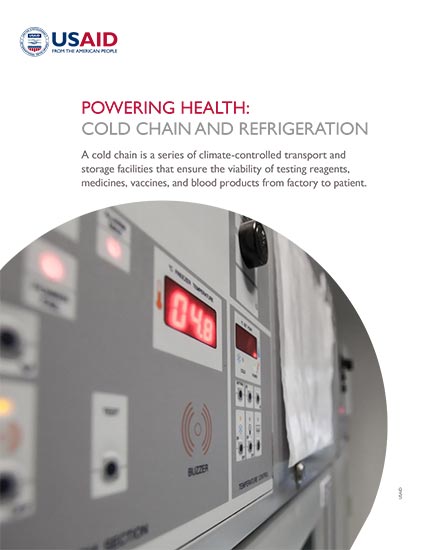A cold chain is a series of climate-controlled transport and storage facilities that ensure the viability of testing reagents, medicines, vaccines, and blood products from factory to patient.
Medical refrigerators are used to store many health-care supplies: blood products, vaccines, medicine, and testing reagents. Each has a slightly different chilling requirement. Vaccines are sensitive to both heat and cold and so need to be kept between 2°C and 8°C from the point of manufacture to the point of use. In order to properly store blood and blood products, blood bank refrigerators need to keep internal temperatures between 2°C and 6°C all day, every day. Some vaccines need to stay frozen, so medical freezers must maintain internal temperatures between -15°C and -50°C . The lack of access to electricity or intermittent power supply in many remote health-care facilities complicate the storage of these critical medical supplies.
Considerations When Choosing a Medical Refrigerator
When choosing a refrigerator for blood, vaccine, or reagent cold storage, facility managers should consider numerous specifications that affect the cost of operation and temperature stability. These specifications include capacity, energy use, approved refrigerator use, ambient temperature ratings, power source, holdover time, reliability, price, required training, and refrigerant selection.
Types of Cold Chain Refrigerators
Different refrigeration technologies have been developed to extend the cold chain to remote areas, including 12 volt electric, liquefied petroleum gas (LPG), gas/electric hybrid, and kerosene-powered models.
Temperature-Monitoring Equipment
Temperature monitoring is a crucial part of the cold chain. There are many methods that have been developed to monitor temperature during the transport and storage of medical products.
Additional Resources
-
USAID
Analyze Energy Demand and Supply
Before investing in any energy technologies, a health facility must first understand its current day-to-day energy requirements. An initial energy audit is critical to ensuring proper system design and operation. Learn more
-
Ken Olson / Solar Energy International
Cold Chain and Refrigeration Standards
The World Health Organization (WHO) provides specifications for different categories of refrigerators and freezers used by health-care facilities. It also lists the products that comply with these specifications. View the standards


Comment
Make a general inquiry or suggest an improvement.